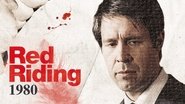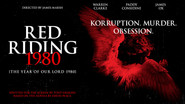CinemaClown
The second chapter of the Red Riding Trilogy, In the Year of Our Lord 1980 blends the real- life case of The Yorkshire Ripper into its fictional story and follows a Manchester detective who is assigned to assist the Yorkshire police in apprehending the serial killer but ends up uncovering something far more sinister.Directed by James Marsh (best known for Man on Wire & The Theory of Everything), this TV feature does offer slight improvements over the preceding chapter for the plot twists unfold in a more sensible manner, even the elements of mystery & suspense make its presence felt unlike the last time, and the captivating score further enhances the whole experience.However, despite bringing the Yorkshire Ripper arc into its storyline, In the Year of Our Lord 1980 never really deals much with that subplot, something that I was really looking forward to, and is simply a continuation of the same themes that surfaced in the previous part. Still, it's a definite upgrade over its predecessor for the direction is more confident, execution is more refined, and experience is more fulfilling.
bob the moo
The second part of the trilogy takes a similar approach to the first film in that it sets us up with a serial killer (this time the Yorkshire Ripper) but really is more interested in the crimes going on behind the scenes with the police and politicians. In this case I think I enjoyed the film more than the first one because I was aware of this and, although I was interested in the hunt for the Ripper, I knew to almost try to focus away from it. This is a strange feeling and it is one that I still think I struggle with on this second film – that basically the main text of the film is actually subtext and vice versa. This film makes this particularly true since the resolution of the Ripper story barely makes a ripple whereas the film ends with an almighty splash that is sure to bring me back for the final film.This almighty splash is all the more important because for the most part the film moves quite slowly and every that occurs seems to be suggested between the words. This makes for a good tense atmosphere even if it doesn't exactly get the pulse racing. This slow burn is quite satisfying though and, like I said, with my understanding of the direction more in place, I found it more engaging. This isn't to say it is perfect though and I still am a little confused by the universal acclaim for this film and the 10 out of 10 gushing that many here on IMDb have delivered. The slow delivery adds to the feeling of a deep, complex tale which to be honest the material here doesn't fully support. Unlike the first film at least the pacing is better and I didn't feel like we were in a race but rather than it played out as it should, although having never read the books I am not sure if this came at a cost to the source material.The heavyweight cast certainly helps the film and they fit the serious tone of foreboding pretty well. I'm sure Considine has been bad at some point but not in my memory and certainly not here; he is convincing in his underplaying and he makes for an engaging lead. Morrissey, Carter, Harris, Pitts and others all fill out the cast really well, again with performances that fit the tone and pace of the film well. If there is a fault it is that they are all very uniform in their characters and there is perhaps too much consistency in the "grim op norf" performances, but still.1980 improves on the first film, partly by virtue of being better paced but also partly by the viewer (me) now having the context as to what the film is really about rather than what the plot summary suggests. It is grim and engaging even if it isn't the most thrilling and it ends with a very satisfying conclusion that will bring me back for the final film.
Robyn Nesbitt (nesfilmreviews)
"Red Riding: 1980" follows more or less the same formula as the first installment: an illicit sexual relationship complicates an investigation--and provides a disturbing commentary on, a series of grisly crimes against women. "Red Riding: 1980" introduces a new main character: Peter Hunter (Paddy Considine), a "clean" Manchester cop being brought in to investigate the local police force's handling of the high-profile "Yorkshire Ripper" case. To date, 13 women have been killed by what is presumed to be one person, but there have been no arrests and little progress. (Events in this movie are loosely based on an infamous real-life case.) Peter's hand- picked team includes two past associates: the businesslike John Nolan (Tony Pitts) and Helen Marshall (Maxine Peake), with whom he previously had an affair. Hunter gets little help but plunges ahead, discovering that one of the 13 victims may have a different killer. Hunter begins to the investigation, thinking it has something to do with his previous visit to Yorkshire in 1974, when he rubbed the local authorities the wrong way while investigating a shooting. As Detective Hunter delves deeper into the case, it becomes increasingly obvious that incompetence isn't likely to blame for the lack of progress made by Yorkshire police. The acting in "Red Riding: 1980" is improved from it's predecessor. Paddy Considine is an established, respected actor and it shows in his performance. The members of the supporting cast, with the exception of Maxine Peake, are solid. Warren Clarke is very good at being an utterly despicable villain despite limited screen time. This second film, directed by "Man on Wire" James Marsh, was shot in 35mm widescreen. The more polished look however, does nothing to diminish the ominous atmosphere- -or the sense of oppression accompanying the setting. In all three films, Though the films--each by a different director--share some of the same characters, there's no epic build from one episode to the next. Rather, after each part concludes, the next more or less begins from a standing start. "Red Riding: 1980" is the movie in which the trilogy comes into its own. Gone is the uneven pacing associated with the first film. The film itself is sturdier than it's predecessor especially as its pace tightens with Marsh displaying a palpable mastery of tension. This production starts at a high level and proceeds on a clear and strong trajectory. It tells its own story while at the same time expanding the canvas of the overall tale. The ending completes the individual arc--but leaves the viewer yearning for more. It's hard to imagine anyone watching this film not seeking the time and opportunity to see the final volume of the trilogy.
dbborroughs
A special investigator is called into take over the Yorkshire Ripper case because the public is screaming bloody murder. The investigator's name is Hunter and he begins by creating a small task force to go over what has been learned before and to investigate the new leads that he is turning up. Hunter almost instantly runs into trouble with the Yorkshire police who feel that he's going places he really shouldn't. He slowly begins to annoy a hornet's nest that threatens everyone, especially himself since the people he's ultimately chasing down will do anything not to have their crimes brought into the open.A different film than the first one. Its often a police procedural that takes on Noirish trappings as Hunter begins and affair and he finds that there is much darkness in the "good" guys. He also learns first hand the price of not letting it all alone. Its a leisurely film that takes its time going on its merry way. For most of the film it seems completely unconnected to the first one except that several characters appear in both films. And then toward the very end things shift. What the film has been getting at suddenly becomes clear.As a stand alone film this is okay. It goes through events and has a conclusion that works with in context. If one didn't know that stuff went before and after I'm pretty sure that you could watch the film and like it, but I don't think it will blow your skirt up that much. At the same time, if you're viewing the film as part of a trilogy, where you've seen the first part, and you know that there is a third part, the film plays so much better. To be perfectly honest I was liking the film for most of its running time,and I was perfectly content to consider letting my Dad, who came late into the film (I was watching this on IFC in Theaters), turn the station, that was until suddenly the film connects to the previous one and you suddenly see the larger picture. As a bigger picture the film is very much a better film, especially if you allow it to take you where its going on its own terms.





